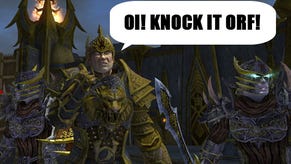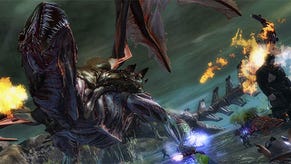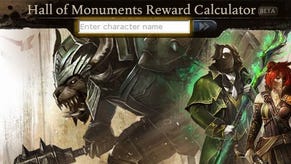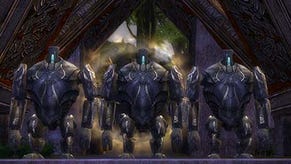Guild Wars 4th Birthday: Eric Flannum Interview
It's an anniversary. Four years today the original Guild Wars: Prophecy came out. Seeing this day approaching, we grabbed the chance to have a quick e-mail exchange with designer Eric Flannum about all that time and even let him include "®" symbols in his answers, as the birthday boy can do such things. We also resist trying to make Eric talk about Sacrifice, the other splendid game he was involved with, because this is Guild War's special day and it's hardly the time or the place. Questions and answers are found below in an instanced area below.
RPS: Four Years. Let's start with a fluffy one: how do you feel?
Eric Flannum: Everything feels great. The first Guild Wars® game is still going strong and Guild Wars 2™ is shaping up nicely.
RPS: Guild Wars is, to say the least, a novel game. What are you most proud of about it? What's been the high-point since?
Eric Flannum: I’m most proud of how well we’ve been able to build the world of Tyria and make it a place that a lot of fans have really gotten into. I think a high point came at a fan appreciation event we had awhile back, where we brought some of our most dedicated fans out to ArenaNet® to give them a tour of the place and hang out with them a little. I was talking to one of the fans and she told me (a bit apologetically) that she was starting to find Guild Wars a little boring after putting over 1,000 hours into it. I was fairly amazed by that, since we built Guild Wars to be a game that people didn’t have to play like a second job, and yet clearly a lot of them still loved the game and the world enough that they wanted to invest a lot of time into it.
RPS: You have time travel and a one-paragraph message to send to your past selves as they were conceiving the game. What would you tell them?
Eric Flannum: That’d be a long paragraph! I think the short version would go something like this:
Hey, guys. This is Eric, messaging from the future. I don’t have much time but I wanted to tell you about one important improvement we’ve made recently to the game. We separated all of the skills into PvP and PvE versions. Please do this now. It will keep you from having to nerf a bunch of skills in PvE for the sake of balance in PvP. It will also let you buff skills that are weak in PvE without worrying about PvP impact. Oh, also…buff Otyugh’s Cry!
RPS: There was a clear development across the various versions of Guild Wars as the team got increasingly familiar with their engine and what they could do with it. Could you talk about that growing experience? How did you plan the development of the game?
Eric Flannum: One of the most gratifying things about the way we developed the campaigns was getting to see our team work with the existing engine and get better and better at working with it. In particular, our artists were able to do some amazing things as the series progressed. Because we were developing each campaign as a stand-alone experience, it also forced us to gain a lot of experience developing and working together as a team in a short period of time. When you think about it, we developed two stand-alone games and an expansion in about three years—an amazing accomplishment, given how big those games are. I think that this is going to pay off as we move forward as a company. We’ve got a ton of really experienced and talented people here.
RPS: And while we're talking about that, which is your favorite of the Guild Wars campaigns?
Eric Flannum: My particular favorite is definitely Guild Wars: Nightfall®. In addition to having what I thought was our best story and best overall gameplay, I loved the African theme of that game. I thought our art and design teams did a great job capturing a look and feel that you don’t often see in other fantasy games. One of my favorite games of all time is Quest for Glory 3, which shared the African theme, and it was fun to work on something similar.
RPS: Guild Wars occupies a position in the market of Online Games that’s always tricky to make out. While everyone argues over the rise and fall of subscriber games, you seem to stand to one side—do you feel this is true? Do you think you're more overlooked than you would be if you were more traditional?
Eric Flannum: It’s hard to think that we’ve been overlooked when we’ve broken 5 million copies sold and are rapidly approaching 6 million. It’s tricky to play the “what if” game and imagine that we’d have been more or less successful, or more or less popular had we gone a more traditional route. It’s possible that we could have done better, but it’s hard to argue with the strategy that has allowed us to succeed to the degree that we have today.
RPS: Here's one—it seemed to me that at least part of the thinking behind Guild Wars was based on the idea that there's a hard limit on the number of people who'd be willing to subscribe to an online RPG. You could reach a larger audience by offering a game without one. And, looking at the world when Guild Wars was conceived, that would seem to be a fair assumption. And then along came World of Warcraft and everything changed. How much did that surprise you? Any thoughts on it now?
Eric Flannum: I don’t think we believed that there was a hard limit to the number of people who would subscribe to an online RPG, but rather that there would be more people willing to play a game that they didn’t have to subscribe to. I think that we still hold that belief, and take WoW’s success as an indication that the audience for online RPGs is even larger than we thought.
RPS: And are you surprised no one else has followed your model? We've separated into the subscription and micropayment model, with few attempts to combine them. Guild Wars was a success, y'know? It's not as if the industry doesn't copy successes.
Eric Flannum: A lot of the success of the Guild Wars business model is due to our fantastic engineering team. They allow us to operate Guild Wars profitably and not charge a sub. That being said, it is a bit surprising that nobody else has at least tried to replicate what we’ve done.
RPS: While the game started there was a separation between PvP and PvE experience. As the years went on, you facilitated that to even greater degrees. Looking forward, from what you've said so far, Guild Wars 2 seems to take that even further. Were you at all surprised that the division between the two experiences were so pronounced?
Eric Flannum: We weren’t entirely surprised that the division existed, but I think we didn’t fully understand how wide the division was, or all of the subtleties of what different players really wanted. For Guild Wars 2, I think we have a much better understanding of the issues we face with both the PvP and PvE communities.
RPS: Thanks for your time.












